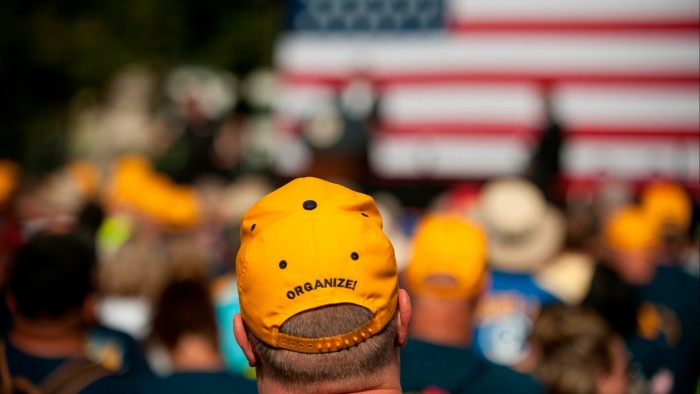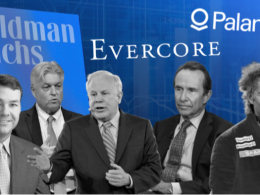And so begin thousands of anxious conversations within governments and companies around the world. What does Donald Trump want, what can we buy off his tariffs with, how can we distract him? As I’ve said before, one massive problem is that the Trump camp has a grab-bag of contradictory ideas and people. Another is that he favours deals stretching across unrelated areas and involving personal favours. (The US undermining Nato unless the EU lays off Elon Musk is both horrifying and horrifyingly plausible.)
Today’s newsletter is a plea to chuck the Biden-Harris “worker-centred trade policy” in the trash. Charted Waters is on oil production under the Biden administration. And so my question for readers: pick a trading power to be in charge of (China, Mexico, the EU, the UK, whatever) and tell me: what’s your Trump-proofing game plan?
Get in touch. Email me at alan.beattie@ft.com
Blue collar, red states
This is not going to be an election postmortem. (I’d recommended this, referencing this, if you want a brief one.) But if there’s one idea that I hope — probably in vain — the result will lay to rest, it’s that the Democratic party loses votes from the working class because its trade policy ignores them.
It’s not just trade that’s subject to this particular fallacy. Michael Cohen of the Fletcher School at Tufts University correctly points out here that criticisms that the Biden administration didn’t try to help lower-income workers are absurd. Through massive spending programmes and labour market measures, it spurred rapid growth in manufacturing jobs and increased the wages of the low-paid enough to reverse a third of the growth in wage inequality since 1980. A huge feat.
It’s similarly hard to imagine what more the Biden administration could have done with trade policy to signal its blue-collar credentials. It labelled its approach “worker-centred” and sacrificed pretty much everything in sight — including relations with foreign policy allies, international law and, bizarrely, investment and jobs — to that end.
The administration allowed labour unions and their allies in leftist pressure groups such as Public Citizen to scare it into ruling out the very idea of negotiating meaningful trade agreements. It maintained most of Trump’s tariffs on China and added some more — especially on electric vehicles — in the pursuit of expanding manufacturing.
For the benefit of Midwestern steelworkers, it kept the Trump “Section 232” national security tariffs on steel and aluminium in place. Despite Biden’s alleged internationalist instincts, the US trade representative Katherine Tai — who impressed very few international interlocutors — ineptly tried to bully the EU into three separate iterations of a “green steel club” to band together and raise duties. EU officials report being told they had to fall in line to help the Democrats win steelworker votes in Pennsylvania.
In fact, the administration was so fixated on getting votes from the steel unions that it backed their call to block Nippon Steel’s takeover of US Steel, even though the management of the American company said that would hurt investment and jobs. (I can personally testify to the obsession with steel: I was firmly told that I was doing myself no favours with the administration by being snitty about the industry. I did not stop being snitty.)
As of September this year, the administration had brought 27 cases under the Rapid Response Mechanism of the US-Mexico-Canada (USMCA) trade agreement — a provision designed to help the US enforce protection of workers’ rights in Mexico. (See the links section below for a very interesting study on the subject.) Tai was known to be highly frustrated that the RRM didn’t get more media coverage, what with everyone banging on about China instead.
The administration further annoyed allies (who, to be fair, did overreact considerably) by bringing in controversial and probably WTO-illegal domestic-content requirements in the IRA to create auto jobs in the US. While negotiating an agreement on critical minerals with the EU, it tried to insist on the right to inspect labour conditions in European mines and processing plants.
It complicated talks on fisheries subsidies in the WTO by abruptly introducing proposals on forced labour on fishing vessels midway through the negotiations. More broadly, reflecting the aversion among the labour movement in general and the steel unions in particular to the WTO and its dispute settlement process, it dismayed other WTO member governments by continuing to hobble the institution’s judicial function. And so on, and on, and on.
Join me and colleagues in the US and Europe this Thursday for a Q&A on how a Trump administration will transform global trade. Leave your questions in the comment section under this article.
The state of the unions is weak
Whether any of this — unlike the administration’s public spending programmes — actually benefited anyone but a small privileged segment of workers, mainly in the unionised steel and auto industries, is debatable. The monomania about steel is particularly bizarre when you recognise that there are 80 jobs in downstream steel-using industries for every one in steel itself.
Conflating organised labour with something called the working class is misleading in a country where union coverage is so narrow. I suspect it’s often not appreciated outside the US how pitifully small the country’s labour union movement actually is, not to mention its repeated problems with corruption and links to organised crime. Only 12 per cent of US employees have the right of collective bargaining, barely a third of the OECD average. The big three industrial unions — the steelworkers, the autoworkers and the Teamsters — have fewer active members than Belgium’s trade union movement.
The US labour movement may be undersized but it nonetheless had a trade policy very largely designed by a Democratic administration around its wishes. Whatever else the “worker-centred trade policy” achieved — it was almost certainly a net negative for the economy and jobs — getting blue-collar workers to vote Democrat wasn’t it. If working-class voters think the Democrats have abandoned them then that’s a messaging problem, or it’s because of other issues such as immigration, not trade. Inflation seems to have been a big issue with lower-income voters. And whatever else Biden’s trade policy achieved, it didn’t bring down prices.
A lot has been sacrificed in terms of economic efficiency, relations with allies and the international rule of law to no apparent end. If the Democrats ever get into power again, maybe they could have a shot at setting trade policy according to whether it will generate growth rather than being in thrall to an ideological and electoral calculus, which failed even on its own terms.
Charted waters
Just in case we run away with the idea that the Biden era was a golden age for renewable energy, let’s recall that US fossil fuel production (aided by subsidies in the IRA) also hit record levels.
Trade links
-
A very interesting paper from Georgia University’s Desiree LeClercq and colleagues on whether the aforementioned USMCA rapid response mechanism, which supposedly used US leverage over trade to improve Mexican auto workers’ rights, actually worked. Conclusion: it has had some effect, but a lot of Mexican workers aren’t actually aware of what it’s supposed to do.
-
A deal struck at the OECD over minimum corporate tax rates and avoiding companies shifting profits between jurisdictions may be under threat from Trump’s election victory.
-
The FT looks at how the US’s immediate neighbours Canada and Mexico will cope with a Trump presidency.
-
The FT’s Energy Source newsletter examines whether the renewables boom will survive Trump.
-
UK chancellor Rachel Reeves, who was until recently in favour of Biden-style “securonomics” and has supported a hard Brexit because of fears about immigration, is apparently now going to give a robust defence of free trade in the face of Trump’s tariff threats this week.
-
Fellow newsletter writer Sam Lowe explains how to survive a trade war with the US.
Trade Secrets is edited by Harvey Nriapia
Source link








